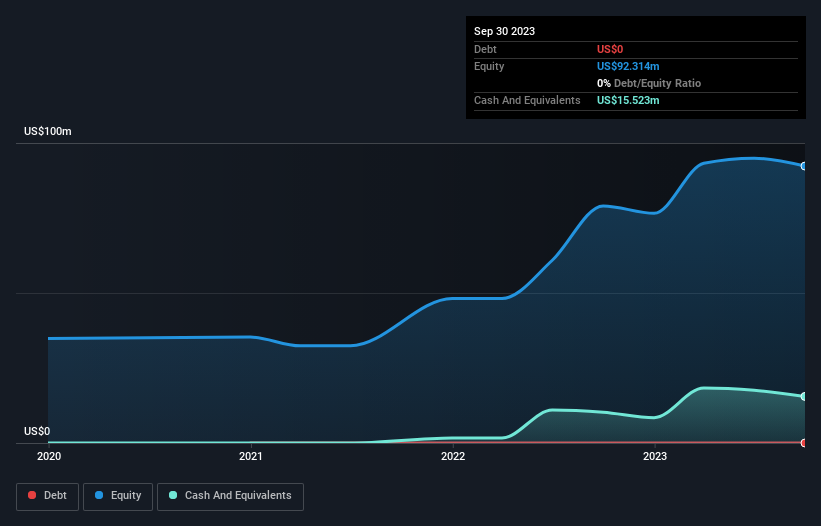Companies Like OceanPal (NASDAQ:OP) Are In A Position To Invest In Growth
Just because a business does not make any money, does not mean that the stock will go down. For example, although software-as-a-service business Salesforce.com lost money for years while it grew recurring revenue, if you held shares since 2005, you'd have done very well indeed. But the harsh reality is that very many loss making companies burn through all their cash and go bankrupt.
So should OceanPal (NASDAQ:OP) shareholders be worried about its cash burn? In this article, we define cash burn as its annual (negative) free cash flow, which is the amount of money a company spends each year to fund its growth. We'll start by comparing its cash burn with its cash reserves in order to calculate its cash runway.
See our latest analysis for OceanPal
When Might OceanPal Run Out Of Money?
A company's cash runway is calculated by dividing its cash hoard by its cash burn. In September 2023, OceanPal had US$16m in cash, and was debt-free. Looking at the last year, the company burnt through US$4.7m. So it had a cash runway of about 3.3 years from September 2023. A runway of this length affords the company the time and space it needs to develop the business. The image below shows how its cash balance has been changing over the last few years.
How Well Is OceanPal Growing?
OceanPal actually ramped up its cash burn by a whopping 78% in the last year, which shows it is boosting investment in the business. That does give us pause, and we can't take much solace in the operating revenue growth of 6.5% in the same time frame. Taken together, we think these growth metrics are a little worrying. Of course, we've only taken a quick look at the stock's growth metrics, here. This graph of historic earnings and revenue shows how OceanPal is building its business over time.
How Hard Would It Be For OceanPal To Raise More Cash For Growth?
OceanPal seems to be in a fairly good position, in terms of cash burn, but we still think it's worthwhile considering how easily it could raise more money if it wanted to. Companies can raise capital through either debt or equity. One of the main advantages held by publicly listed companies is that they can sell shares to investors to raise cash and fund growth. By comparing a company's annual cash burn to its total market capitalisation, we can estimate roughly how many shares it would have to issue in order to run the company for another year (at the same burn rate).
OceanPal has a market capitalisation of US$20m and burnt through US$4.7m last year, which is 23% of the company's market value. That's not insignificant, and if the company had to sell enough shares to fund another year's growth at the current share price, you'd likely witness fairly costly dilution.
Is OceanPal's Cash Burn A Worry?
On this analysis of OceanPal's cash burn, we think its cash runway was reassuring, while its increasing cash burn has us a bit worried. Cash burning companies are always on the riskier side of things, but after considering all of the factors discussed in this short piece, we're not too worried about its rate of cash burn. Separately, we looked at different risks affecting the company and spotted 3 warning signs for OceanPal (of which 2 are a bit concerning!) you should know about.
If you would prefer to check out another company with better fundamentals, then do not miss this free list of interesting companies, that have HIGH return on equity and low debt or this list of stocks which are all forecast to grow.
Have feedback on this article? Concerned about the content? Get in touch with us directly. Alternatively, email editorial-team (at) simplywallst.com.
This article by Simply Wall St is general in nature. We provide commentary based on historical data and analyst forecasts only using an unbiased methodology and our articles are not intended to be financial advice. It does not constitute a recommendation to buy or sell any stock, and does not take account of your objectives, or your financial situation. We aim to bring you long-term focused analysis driven by fundamental data. Note that our analysis may not factor in the latest price-sensitive company announcements or qualitative material. Simply Wall St has no position in any stocks mentioned.

